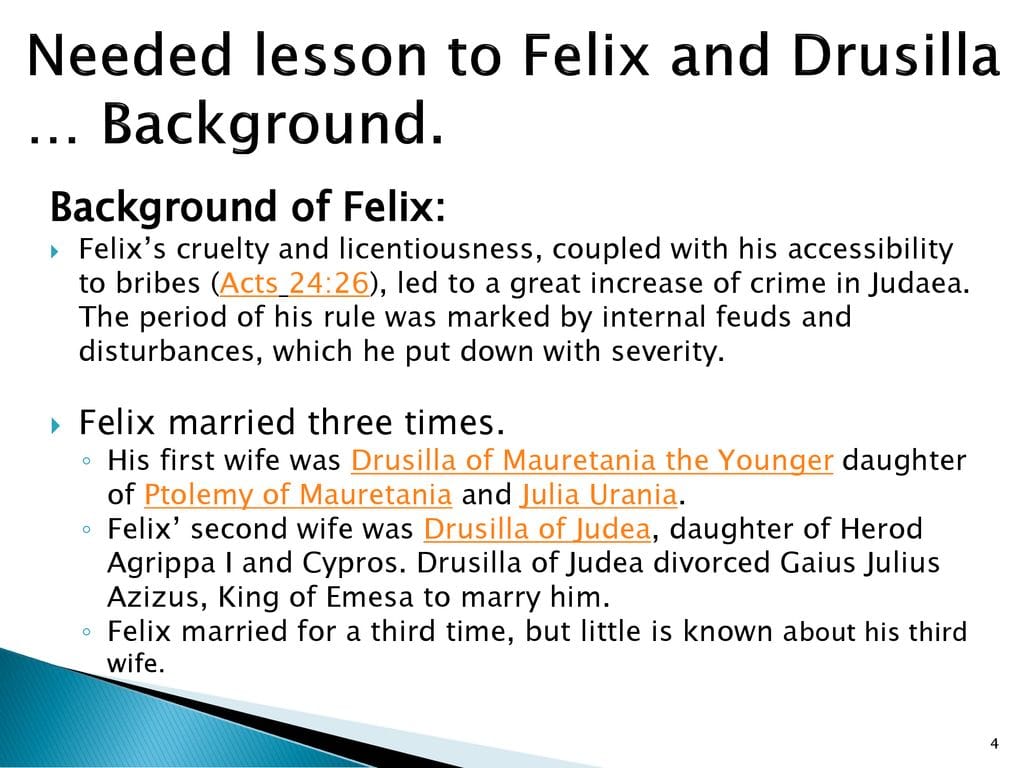Drusilla of Mauretania the Younger, a princess whose life intertwined with both the grandeur and machinations of the Roman Empire, remains a captivating figure in history. Born around 38 AD, likely in Caesaria (modern-day Cherchell, Algeria), her story unfolds against a backdrop of shifting political landscapes, cultural assimilation, and the enduring legacy of her ancestors, among them, the iconic Cleopatra. While often overshadowed by her famous great-grandmother, Drusilla’s life offers a unique window into the complexities of the Roman world in the first century AD.
A Princess Between Two Worlds: Drusilla’s Lineage and Early Life
Drusilla’s lineage is a subject of ongoing scholarly discussion. The Roman historian Tacitus asserts that Drusilla was Cleopatra’s granddaughter, born to Juba II and Cleopatra Selene II, the reigning monarchs of Mauretania. However, chronological evidence suggests a different, perhaps even more intriguing, narrative. It’s more probable that Drusilla was Cleopatra’s great-granddaughter, her parents being Ptolemy of Mauretania and the enigmatic Julia Urania. This relatively unknown queen emerges only briefly in historical inscriptions, leaving historians to puzzle over her origins and the role she played in shaping Drusilla’s destiny. Was Julia Urania, as some believe, connected to the royal family of Emesa? The mystery surrounding her ancestry deepens the intrigue surrounding Drusilla’s own story. This ambiguity, characteristic of many historical figures, reminds us that history is often less about definitive answers and more about exploring possibilities.
In 40 AD, tragedy struck. Ptolemy, Drusilla’s probable father, was executed in Rome, and Mauretania, her ancestral kingdom, was absorbed into the Roman Empire, divided into two provinces. Imagine young Drusilla, barely a toddler, caught in this tumultuous shift of power. A princess without a throne, she was likely raised within the Roman imperial family itself, navigating the opulent and undoubtedly overwhelming world of Roman aristocracy. This upbringing, steeped in Roman culture and education, undoubtedly shaped her identity. Did she view this as a life of privilege or a gilded cage? The historical record leaves much to our imagination.
Marriages of State: Drusilla and Roman Power
Drusilla’s marriages, like those of many royal women in the era, were not matters of romantic love but carefully orchestrated political alliances. Around 53 AD, Emperor Claudius arranged her marriage to Marcus Antonius Felix, the Roman procurator of Judea, a man known for his ruthlessness. This union served to solidify Roman control over the newly acquired Mauretanian territories and linked Drusilla to a key figure in the often-turbulent region of Judea. This suggests that, despite her young age, Drusilla played a significant, albeit perhaps involuntary, role in Roman imperial strategy.
Following Felix’s death (or possibly a divorce—the historical record is unclear), Drusilla married King Sohaemus of Emesa around 56 AD. Emesa, a Roman client kingdom in Syria, expands the geographical scope of Drusilla’s story, highlighting the vast network of Roman influence and the strategic importance of royal marriages in maintaining that influence. The devastating invader of Gaul in 451 similarly demonstrates the impact of political upheaval on regional stability, though in a vastly different context. This second marriage raises questions about the extent of Drusilla’s agency. Was she a willing participant, or merely a pawn in Rome’s grand game?
A Legacy Yet to Be Fully Uncovered
Drusilla died around 79 AD, leaving behind a legacy as fragmented as the historical texts that record her existence. Her life, a blend of Mauretanian heritage and Roman influence, serves as a microcosm of the cultural exchange and power dynamics at play during this period. How did she navigate the intersection of these two worlds? Did she retain a sense of her Mauretanian identity within the Roman imperial court? Her story, like the fascinating history and evolution of the diminutif pays, provides a glimpse into the complexities of identity and territorial control within a larger empire.
Ongoing research promises to reveal more about Drusilla’s life, shedding light not only on her personal experiences but also the broader political and social landscape of the Roman Empire. Her story reminds us that history is an ongoing process of discovery, and the seemingly minor figures can offer profound insights into the past.















